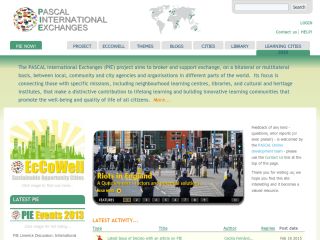Making Education Wider and Higher – Educational Reforms in the last Half-Century
This Symposium was convened at the Haute École des Science Politiques in Paris on 9 April to celebrate and honour the life and work of PASCAL’s first Chair, Dr Jarl Bengtsson. The first half considered his work and impact especially as long-serving Head of the Centre for Educational Research and Innovation of the OECD. The second took the exemplifying case of ‘Universities and their Regions’ as one area where he had been active, and looking at the project PASCAL Universities and Regional Engagement (PURE) in which Jarl played an active leadership part as Chair of the Board of PASCAL. It called attention both to the Manchester UP volume A New Imperative and the just-published NIACE study The Role of Higher Education in Regional and Community Development and in the Time of Economic Crisis edited by Caroline Carlot, Jean-Marie Filloque, Michael Osborne and Peter Welsh. Caroline and Jean-Marie both spoke about the subject and the latter volume, which grew out of an Annual PASCAL Conference held in Brest in 2012.
The Symposium, organised by former colleagues of Jarl, was an intellectually and professionally highly stimulating and convivial affair attended by Jarl’s widow Mady and daughter Thalia. Two dozen participants actively engaged. They ranged from the venerable Ron Gass and Pierre Caspar to graduate students of Science Po faculty member Chris Brooks, another former senior OECD colleague of Jarl. The event was organised by Chris Brooks together with PASCAL’s Mike Osborne and Hans Schuetze, and Jarl’s close OECD CERI friend and colleague David Istance.
This was not a PASCAL event; but it offered a good display of what PASCAL does and has achieved. It was so contrived as to showcase some of the Observatory’s recent work under Jarl’s leadership, and to launch or identify several books generated by PASCAL and published by the Manchester University Press, or by the England and Wales National Institute for Adult Continuing Education (NIACE). The centrepiece was a special extended issue of the Journal for Adult and Continuing Education (JACE), guest-edited by Hans Schuetze and containing chapters by OECD and PASCAL authors, several of whom contributed to the symposium.
Combining a multiple quasi-book launch with a celebratory life’s-work symposium carried risks but a balance was struck. The interest and enthusiasm of young-mature-age Science Po graduate students from different world regions was heartening. Their message was of the uplift felt at hearing an older generation speak of important things in a passionate and values-based way, in a time of one-dimensional commercialisation and monetisation of just about everything - a fitting end-note to a reflection on the life of Jarl that looked forward as well as back.
What stood out from the two sessions was the risk-taking courage of Bengtsson who created space in a large intergovernmental bureaucracy to think and work – to use a title-phrase from the PASCAL Website - ‘Outside the Box’; and to enable CERI staff, other colleagues, and visitors from around the globe to think creatively and exchange ideas. Despite leading an educational policy think-tank for example, Jarl was highly critical of the way that ‘education’ seemed to monopolise ‘knowledge’. Also evident was his tendency to prefer creative discourse leading to policy-related action over the role and work of a traditional book-writing professor. These characteristics, and his remarkable future-scanning capacity, showed how fitting a leader he was for the new Observatory. Intuition and strong will combined to make him a ‘yes we can’ man decades before Obama came onto the scene. If you felt a need for new paradigms, as surely we all should in these times, Bengtsson was your man.
This note makes no attempt to report the substance of the Symposium, only to echo its spirit. For those interested in the substantive issues, please look at the JACE special issue volume 30, Number 2, 2014, guest-edited by Hans Schuetze.
Posted by Chris Duke, Chair of the PASCAL Advisory Council
 Printer-friendly version
Printer-friendly version- Login to post comments
- 469 reads






